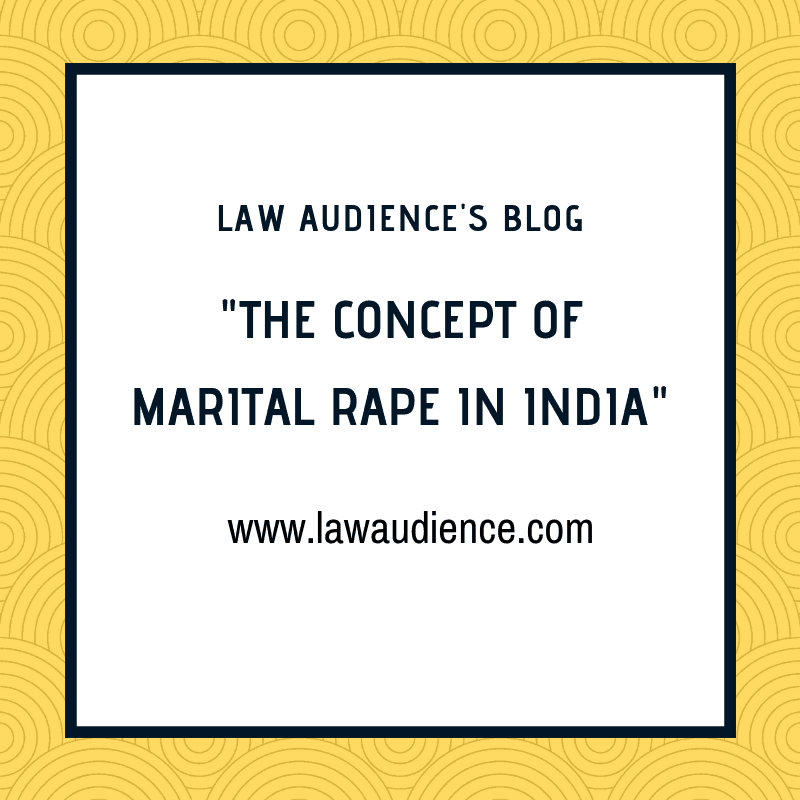AUTHORED BY: MS. NATASHA JAIN, LL.B, STUDENT AT NEW LAW COLLEGE, BHARATI VIDYAPEETH DEEMED UNIVERSITY & RESEARCH WRITER AT LAW AUDIENCE.
I. INTRODUCTION TO MARITAL RAPE:
The impression of the sacred; the tradition of wedding hollow out by the typical Indian films is a fable and is conflicting to womanhood view of realism. However, it is concealed behind the curtain of matrimony but Marital Rape is a very usual and objectionable system of masochism in Indian society. Rape is the most heinous crime committed against women. It finishes a victim physically as well as psychologically. It disturbs both body and soul; if an individual tries to use and misuse of a women’s body for sensual desire without her express or implied consent violates not only individual’s self-respect but also society as a whole. For the protection of women from the crime of rape, we have strict laws and severe punishment against the wrongdoer. But marital rape or influential sexual intercourse by a man with his wife is a harsh reality of our culture. Though everybody considers marital rape as an honorably and virtuously unlawful act not consider as a severe crime. Rape is Rape, whether it is an outsider rape, date rape or marital rape. According to law, marital rape is not a crime.
II. THE CONCEPT OF MARITAL RAPE:
The Marital Rape is unwelcome sexual intercourse committed by a husband, lacking consensus and contrary to wife’s will, consent may be acquired by power, or danger, pressure, or when a wife is not able to give her consent. It is essential to understand that the lack of approval does not always in the form of “NO”. It must be presumed from the circumstance of the condition. In a marriage, if a woman gives her consent to sexual intercourse because there is an intimidation of damage to herself as well as her children, or there is a threat that she will be deprived of the right to stay in house, then that consent should not be considered as valid or free consent and it still amounts to Rape.
III. DIFFERENT TYPES OF MARITAL RAPE:
There are three kinds of Marital Rape that are recognized by legal scholars. These are as follows:
a) BATTERING RAPE[1]:
In this type of rape, women experience both physical as well as sexual forcefulness in the relationship. Women experience this violence in several ways. Some are assaulted during the sexual violence, or some may face rape where the husband wants to have sexual intercourse and compels his wife to have sex without her consent. The majority of marital rape sufferers come under this type.
b) FORCE-ONLY RAPE[2]:
In this type of rape, husbands practice merely required the extent of strength to intimidate their wives; assault or abuse is not the representative of these relationships. The assaults have done only when a woman has refused sexual intercourse.
c) OBSESSIVE RAPE[3]:
In this type of rape, women experience what has been considered as brutal, aggressive or compulsive rape. These battering include cruelty and pertinacious sexual acts and are over and over again bodily violent.
IV. REASONS FOR MARITAL RAPE:
There are several reasons for marital rape some of them are listed below:
(i) Such as sexual distortion of a husband; or
(ii) Want to emphasize dominance over women; or
(iii) Minor household matters; or
(iv) The effort of women to claim her right in a matrimonial relationship, etc.
“The foremost cause of this marital threat is well-known gender discrimination predominant in our society. It is a different side of our patriarchal and male-controlled system of societal customs where no matter whether women are married or single, they do not have the same rights as of men. It is an additional defense for men to abuse and suppress women. In, our outdated society, where a married woman has supposed to be pativrata stri means pure, truthful and polite. As a result, a married woman is made-up to follow her husband’s commands completely and satisfy all his needs short of any inquisitive. And, there is another major reason which raises the spirits of man to carry on with his actions are that the absence of legal provisions identifying marital rape as a crime.[4]”
V. LAW RELATING TO MARITAL RAPE IN INDIA:
In India, Marital Rape is not a crime. Neither the Indian Penal Code, 1860 nor any additional specific statute such as the Domestic Violence Act, 2005 or any other law for the time being in force precisely identifies marital rape as an offence.
VI. INDIAN PENAL CODE VERSUS MARITAL RAPE:
The Rape is defined under Section 375 of Indian Penal Code. It mentions actions which shall be measured as the crime of rape. It furthermore provides fulfilment of conditions which will bring acts as well-defined in the purview of rape. But then again, the meaning does not identify influential intercourse with a wife by her husband as rape[5].
Section 375 (6) says that sexual intercourse by a man with a girl who is below the age of 18 years is rape, both with or without her consensus[6].
Exception 2 attached to Section 375 says that sexual intercourse by a husband with his own wife, the wife not being under the age of 18 years is not rape[7].
“Whoever has sexual intercourse with his own wife, who is living separately, whether under a decree of separation or otherwise, without her consent, shall be punished with imprisonment of either description for a term which shall not be less than two years but which may extend to seven years, and shall also be liable to fine. Explanations: In this section, “sexual intercourse” shall mean any of the acts mentioned in clauses (a) to (d) of section 375.[8]”
But then again, the above-mentioned provisions do not identify the Marital Rape as a criminal offence.
VII. CONCLUSION:
In nutshell, it can be concluded that the concept of Marital Rape is criminalized in many other nations. But, however, it is not criminalized in India. According to Exception 2 of Section 375 of Indian Penal Code, it becomes clear that forced sexual intercourse with the wife, the wife being below the age of 18 years is a rape.
Recently, Member of Parliament, Dr. Shashi Tharoor has introduced a private bill (THE WOMEN’S SEXUAL, REPRODUCTIVE AND MENSTRUAL RIGHTS BILL, 2018) in the Lok Sabha to make marital rape a crime. The Bill proposes the deletion of exception 2 to Section 375 of Indian Penal Code, which states the sexual intercourse by a man with his own wife is not rape.
The Statement of Objects and Reasons of the said bill states: “In furthering this equality, the autonomy of the woman must be rightfully restored to her by granting her the agency over her sexual and reproductive rights. For this, marital rape must be criminalized to eliminate the loss of a woman’s sexual independence post marriage. Further, unrelated facts about a woman’s life such as caste, profession, clothing preference, personal opinion and past sexual conduct, among others should not be factors in presuming her sexual consent. By shifting from a ‘No means No’ to a ‘Yes means Yes’ regime, it transforms us from an era of women having to actively fight for them to be treated with respect and dignity to an era where they will be treated with respect and dignity.[9]”
[1] https://www.lawteacher.net/free-law-essays/family-law/marital-rape.php.
[2] Ibid.
[3] Ibid.
[4] https://www.indiacelebrating.com/social-issues/marital-rape/.
[5] Section 375, The Indian Penal Code, 1860 (India).
[6] Section 375 (6), The Indian Penal Code, 1860 (India).
[7] Exception 2 attached to Section 375, The Indian Penal Code, 1860 (India): In Independent Thought v. Union of India (Writ Petition (Civil) No. 382 of 2013), The Supreme Court has amended the exception 2 of section 375 (Judgement Dated: Oct 11, 2017). Prior to the Judgement, the age was 15 years, but, however, after the pronouncement of the Judgement, now the age has been increased from 15 to 18 years.
[8] Section 376B:- Sexual intercourse by the husband upon his wife during separation, The Indian Penal Code, 1860 (India).
[9] http://164.100.47.4/BillsTexts/LSBillTexts/Asintroduced/2271as.pdf.



